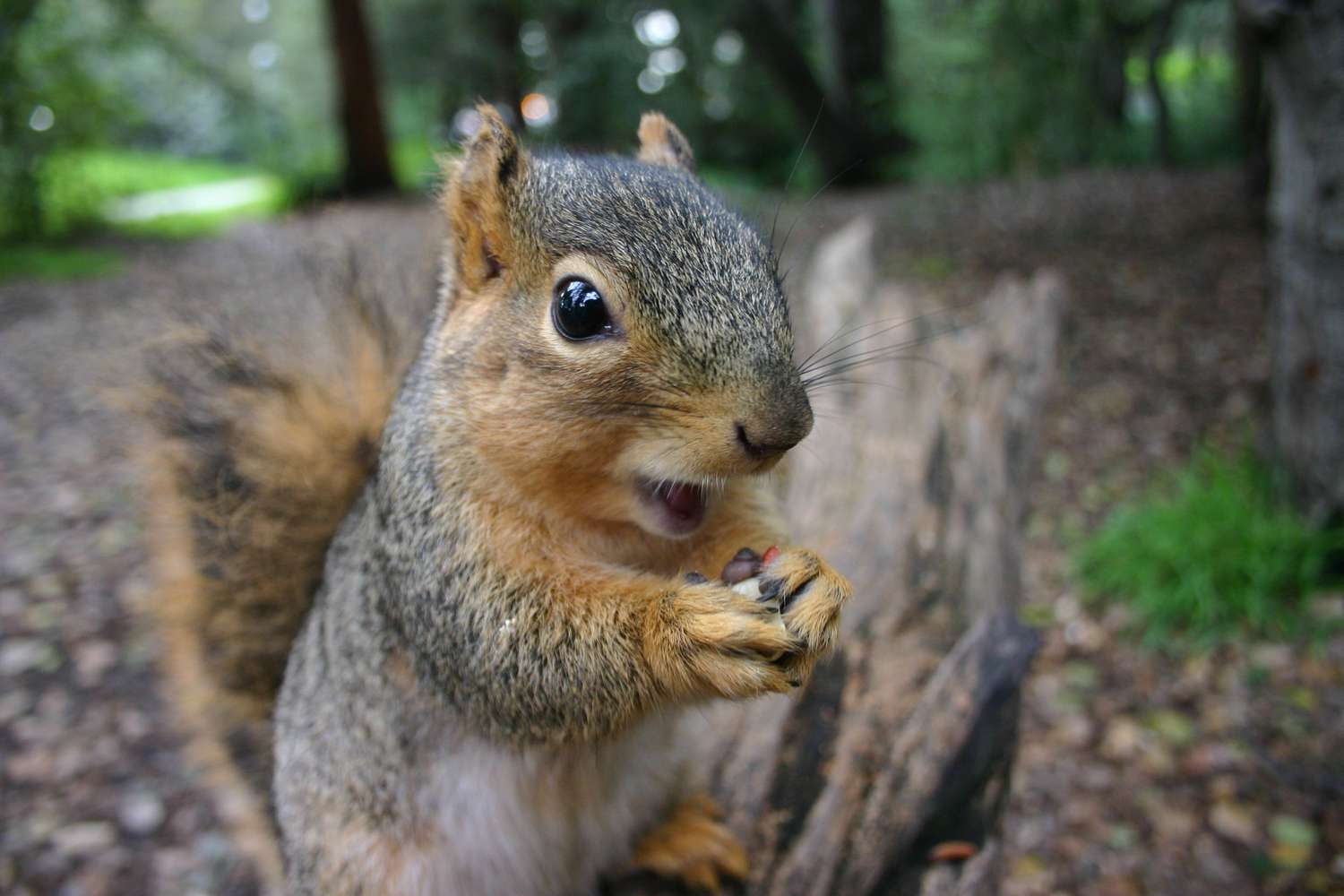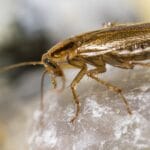Okay, we all think squirrels are kind of cute, right? Scampering around, burying nuts, fluffy tails. But have you ever felt like something was a little off about them? Maybe even a little creepy? Turns out, there’s a reason for that.
Scary Facts About Squirrels
While squirrels might look adorable, there’s a hidden side to these creatures that’s less than charming.
They Aren’t Afraid to Throw Down
Forget cute and cuddly, squirrels can get downright aggressive, especially when they feel competitive during mating season or threatened if you get too close to their nests. Don’t let their size fool you – those little claws and teeth are surprisingly sharp and can cause serious injuries if they bite or scratch.
Tiny Disease Carriers
This is where things get a little creepy-crawly. Squirrels are notorious for carrying diseases, including rabies, Lyme disease, and tularemia. They often carry ticks, too, which can transmit illnesses like Lyme disease to humans and pets.
Electrical Mayhem? Yep, That’s Them
Ever wonder why the power goes out sometimes? Squirrels, my friend. Those little troublemakers love to chew on electrical wires, which can cause fires, knock out power for entire neighborhoods, and even disrupt essential services like phone lines.
Masters of Destruction
Think your attic is safe? Think again. Squirrels are experts at finding ways into homes and buildings, where they can wreak havoc. Gnawing on insulation, chewing through wires, even damaging roofs – their destructive capabilities are surprisingly extensive. And that’s not to mention the potential for contaminated food and water if they get into your pantry.
The Stuff of Nightmares?
Even if you can look past their destructive tendencies, there’s an inherently creepy vibe about squirrels. Maybe it’s their erratic, twitchy movements or those beady little eyes that seem to follow your every move. And the chattering? Let’s be real – those sounds are straight out of a horror movie!
It’s All in Your Head… Sort Of
Some experts believe our fear of squirrels could stem from our ancient ancestors. Back in the day, anything small and furry could have been a predator or competitor for resources. So, it’s possible our brains are hardwired to be a little wary of these creatures. Their unpredictable behavior and tendency to appear unexpectedly can trigger our fight-or-flight response.
So, the next time you see a squirrel, take a minute to appreciate their… unique charm. Just remember, those seemingly harmless critters are capable of much more than you might think.
What are 5 Interesting Facts About Squirrels?
We’ve already dug up some intriguing information about squirrels, but let’s uncover a few more fun facts about these fascinating creatures:
- Squirrels are masters of deception! They’re known for “fake burying” to throw off potential food thieves. They might dig a hole, pretend to place a nut, and cover it up, all while keeping the nut safely stashed in their cheek pouch.
- They’re gymnasts of the rodent world! Squirrels have incredibly flexible bodies, strong hind legs, and can rotate their ankles a full 180 degrees. This allows them to effortlessly climb up and down trees, even headfirst, and leap horizontally up to ten times their body length.
- Squirrels are nature’s gardeners! They might have a reputation for raiding bird feeders, but they play a vital role in forest ecosystems. Their forgetfulness when hoarding nuts and seeds often leads to new trees sprouting from their forgotten treasures.
- They have built-in parachutes! Okay, not really parachutes, but close enough! Squirrels use a trick called “gliding” when leaping from branch to branch. By spreading their limbs and flattening their bodies, they create a parachute-like effect, allowing them to control their descent and land safely.
- Squirrels are more diverse than you think! There are over 200 squirrel species worldwide, from the tiny African pygmy squirrel to the giant Indian giant squirrel, which can grow up to three feet long! Some even have amazing adaptations, like the flying squirrels of Asia, which have skin flaps between their limbs that allow them to glide through the air!
Are Squirrels Good or Bad to Have Around?
Squirrels are super common in our backyards, but are they good neighbors, or should we be giving them the side-eye? Well, it’s complicated.
On the one hand, squirrels are like tiny gardeners, helping to spread plants and trees around by burying nuts and seeds. They’re a food source for other animals, like owls and hawks, and watching them do their acrobatic thing in the trees can be pretty entertaining.
But here’s the flip side: those cute little critters can also be destructive. They might dig up bulbs, munch on garden vegetables, and generally wreak havoc on carefully planned flowerbeds. Their constant chattering and scampering can be noisy, and they can attract fleas. And let’s not forget, they might bite if they feel threatened.
So, are squirrels good or bad? It depends on your perspective and your tolerance for a little mischief. If you love watching wildlife and don’t mind sharing some of your garden bounty, then squirrels can be fun neighbors. But if you’re a serious gardener or have concerns about potential damage, you might want to look into ways to discourage their visits humanely.
What Are Squirrels Scared Of?
They might seem fearless, but even squirrels have things that make them scramble for cover:
1. Noises that make ’em jump: Squirrels have super-powered hearing, which also means loud noises are terrifying. Sudden shouts, thunder, or fireworks send them racing for the safety of their nests.
2. Surprise! (Not the good kind): Squirrels are hyper-aware of their surroundings. Any sudden movement, even just someone walking by, can trigger their internal alarm bells.
3. Whatcha got there? (The case of the suspicious object): Squirrels are creatures of habit. When something new shows up – a garden gnome, a brightly colored ball, a new bird feeder – it puts them on high alert.
4. We might be a little intimidating: We humans can be a bit much for squirrels with all our giant structures and weird noises. If a squirrel has had a bad run-in with a human, they’ll likely keep their distance. However, if we’re patient and observe them quietly, they might warm up to us eventually.
5. Predators – It’s a squirrel-eat-squirrel world (sort of): Hawks, owls, snakes, coyotes – they all pose a real danger to squirrels.
Things are always changing in the world of science:
While we have a good understanding of what makes squirrels nervous, new research is always uncovering more about these fascinating creatures. Want to learn more? Keep exploring!
Should I Worry About Squirrels in My Yard?
Squirrels in your yard? They’re cute, but they can bring unwanted guests to the party – we’re talking about things like ringworm, tularemia, fleas, and ticks, all of which can pose health risks to humans and pets.
And don’t forget about property damage! Those tiny holes in your lawn? Squirrel burrows. They’re not just unsightly – they can be tripping hazards. Squirrels love to gnaw, too – on almost anything! That includes electrical wires and cables around your home, which could lead to fires.
And if you’re a gardener, squirrels might just become your new arch-nemesis. They see a beautifully prepped garden as their personal buffet.
Here’s a table summarizing the potential issues:
| Concern | Description |
|---|---|
| Health Hazards | Can carry diseases like ringworm and tularemia, transmissible to humans and pets. Also harbor fleas and ticks carrying diseases. |
| Property Damage | Burrowing can create uneven surfaces and tripping hazards. Gnawing on wires poses fire risks. |
| Garden Damage | Raid gardens, eating fruits, vegetables, and flowers. Digging disrupts soil and damages plant roots. |
| Unpredictable Nature | While generally not aggressive, squirrels may bite or scratch if they feel threatened. |
So, what’s the verdict?
Having squirrels in your yard doesn’t mean disaster is imminent. It just means you need to be alert and take some precautions. Consider humane ways to deter them from your property, like removing food sources and securing potential entry points.
What is a Squirrel’s Worst Enemy?
Squirrels can’t exactly fight back like larger animals, so they have to be clever and quick to stay safe. But which predator should they be most worried about?
Hawks, with their ability to swoop down from the sky with incredible speed and precision, are a significant threat. Domestic cats, while not natural predators, can also be efficient hunters if a squirrel gets too close to the ground. Coyotes, being larger and more cunning, pose a constant danger, especially since they sometimes hunt in packs. And then there are snakes, those silent and stealthy reptiles that can strike with venomous speed.
Interestingly, ground squirrels have developed some fascinating adaptations over time. Some have developed a resistance to snake venom, and their incredible speed and agility allow them to vanish into burrows or zip up a tree before most predators even know what hit them.
What is the Biggest Threat to Squirrels?
While predators are a significant concern, squirrels face a number of threats in their daily lives:
Predators: A Squirrel’s Worst Nightmare
Hawks, owls, foxes, coyotes, snakes, raccoons – these predators all pose a constant threat to squirrels, who have to be constantly vigilant to survive. Hawks, with their aerial advantage, are particularly formidable.
Humans: More Than Just a Nuisance?
We might not be actively hunting squirrels, but our impact on their environment is undeniable. Deforestation, pollution, climate change, and cars all pose significant threats to squirrel populations.
Beyond Predators: Other Dangers in Squirrel World
- Disease: Rabies, Lyme disease, and other illnesses can impact squirrel populations.
- Competition: Finding food and shelter isn’t always easy when you’re a squirrel competing with other squirrels and species for the same resources.
- Cars: Sadly, many squirrels are killed by cars each year.
It’s difficult to pinpoint a single biggest threat to squirrels. It’s more like a perfect storm of factors, some natural and some human-caused.
What Makes Squirrels Special?
Squirrels are more than just cute backyard acrobats; they possess a unique blend of skills and intelligence that allows them to thrive.
Their spatial memory is incredible! They create intricate mental maps of their surroundings, allowing them to remember the exact locations of hidden food stashes, even months later. They can swim, too, using their bushy tails for balance. And while they might have a reputation for being greedy with their nuts, they’re also capable of altruism, warning each other about predators and even sharing food in times of scarcity.
From their incredible memories to their surprising swimming skills and their capacity for altruism, squirrels are a constant reminder of the amazing diversity and wonder of the natural world.
What Do Squirrels Do All Day?
Squirrels are always on the move, but what keeps them so busy?
Always on the Hunt for a Nut (and More!)
Finding food is a squirrel’s primary occupation. They’re not picky eaters, munching on nuts, seeds, fruits, insects, bird eggs, and even the occasional baby bird if they’re feeling adventurous. And those acorns they’re always burying? They’re storing them for later, thanks to their incredible memory for hiding spots.
Home Sweet Drey
Squirrels build cozy nests called “dreys” high up in trees. Made from twigs, leaves, and other found materials, these dreys provide shelter from the elements and protection from predators.
Family Matters
Female squirrels typically have one or two litters of baby squirrels, called “kits”, each year. The kits are born blind and helpless, relying on their mothers for food and warmth.
Chatty and Social
Squirrels use a range of chirps, squeaks, and chatters to communicate with each other, warn of danger, defend their territory, and stay in touch. They’re also expressive with their body language, using tail flicks and postures to get their point across.
Unraveling the Mysteries
While we’ve learned a lot about squirrels over the years, there’s still much we don’t know. Researchers are constantly making new discoveries about their behavior, intelligence, and how they adapt to different environments.
How Many Years Do Squirrels Live For?
The average lifespan of a wild squirrel is only around 5-10 years, much shorter than many people realize. Young squirrels, in particular, are vulnerable to predators, harsh weather conditions, and disease.
However, different types of squirrels have different lifespans. A little African pygmy squirrel might only live for 3-5 years, while the larger Indian giant squirrel can live for almost two decades!
Interestingly, squirrels tend to live longer in captivity – up to 20 years with proper care, food, and a safe environment.
Do Squirrels Recognize People?
Squirrels have excellent memories and are particularly good at remembering where to find food. This ability extends to recognizing people, especially those who regularly feed them.
Squirrels are quick learners and adept at picking up on patterns. If you regularly feed squirrels in your yard, they’ll likely start to recognize you and may even approach you, hoping for a snack. Conversely, if you’ve chased them away or made them feel threatened, they’ll likely remember that, too!
As humans continue to encroach on their habitats, squirrels have adapted to live alongside us, becoming more accustomed to our presence. Their intelligence and adaptability make it highly likely that they can remember individual people, particularly those who play a consistent role in their environment.
So, the next time you see a squirrel in your yard, don’t just dismiss it as a furry blur. Take a moment to observe its behavior. Does it seem wary, curious, or even a little bit familiar? You might be surprised by how much these creatures notice and remember about the world around them, including you!
And just for fun, if you’re interested in learning about other fascinating creatures, check out these articles:
- Prepare yourself to be spooked as you delve into the scary facts about cockroaches!
- Dive into the fascinating world of sea anemones and discover their captivating beauty!












